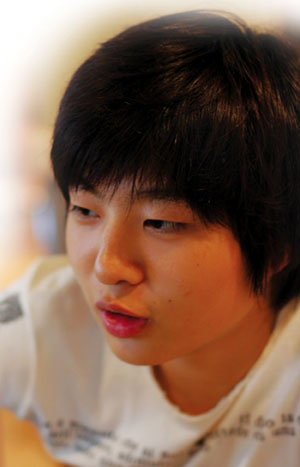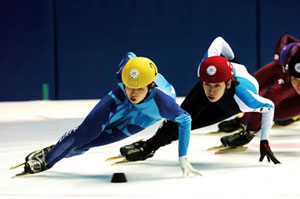Interview with a short track skater, Sung Si-bak
 | ||
| ▲ Photographed by Lee Yang-jung | ||
The Annals: How did you start skating?
Sung: I first started skating at third grade of elementary school. Although I didn't want to do it, my parents forced me to do it because I was very weak. I didn't think I could do it but I did and today it's a job for me.
Then, wasn't it difficult to skate and study at the same time?
I didn't have much time to study and enjoy school life. When I was in middle school, I even wanted to quit skating because it was so exhausting to exercise while my friends just studied. Short track requires more physical training than it seems. After going to high school, I felt that it was too late to study and that skating was the only path for me. In my last year of high school, the homeroom teacher even told me not to come to school and just skate. There wasn't even a desk for me at school. Hence, I don't have many special memories with friends in middle school and high school.
 | ||
| ▲ Contributed by Yoon Yong-jin | ||
I don't come to school during the skating season. The professors let me substitute exams with reports. I can participate in AKARAKA or the Yon-Ko Fete. only when I don't have practice. (Sung couldn't participate in the 2006 AKARAKA because practice was starting on the day of AKARAKA.) I usually take lectures with fellow athlete students and have also taken Globalization and Understanding Media Society. In lectures with team meetings, other team members were quite considerate about my absence.
Are there any difficulties as an athlete in Yonsei? If there are, what made you come here?
The skating environment is a bit insufficient. There is only one other short track skater (Ko Gi-hyun) in my grade, so we tend to practice with Korea National Sports University students. I especially like Ahn Hyun-soo. He has a great personality and is a fantastic skater; he influences me a lot. Anyway, despite some difficulties, the reason I came to Yonsei is because I wanted to enjoy school life with students other than athletes and experience more than sports.
You competed in many international races; do you have special memories?
Foreign athletes are very friendly to the Korean skaters. One reason is because the Korean team has many world rankers and top techniques. For instance, in the 2002 Salt Lake City games, many foreign players were in favor of Ahn rather than Ohno.
Please share your future plans with us.
I haven't thought about the far away future. But in the foreseeable future, I'll prepare to be a member of the Korean national team; the match is planned for September. Then, I'll train for international matches.
Short track skating experts have spotted Sung as the next world champion-to-be; he recently beat top-ranking skaters such as Ahn Hyun-soo and Lee Ho-seok, gliding on as the champion of men's short-track skating in the national meet. The Annals wishes luck on the upcoming competition for the national team and true happiness in life, to this good sport.
| Profile Soph., Dept. of Sport and Leisure Studies - Third place in 2003 World Junior Championships |

